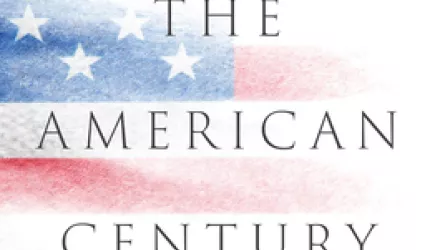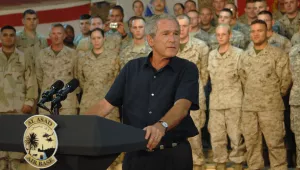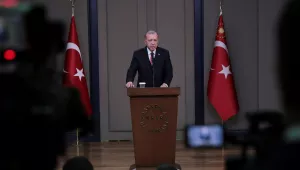Prime minister made London a financial giant, brought prosperity to Brits and led the move away from socialism
British Prime Minister Tony Blair announced yesterday that he would step down after 10 years in office. As far as most constituents are concerned, it's not a minute too soon. But it won't be too long before his countrymen accord him a major place in history and maybe even in their hearts.
Of course, it doesn't look like that just now. In his last years in office, Blair has been trapped by the quagmire of the Iraq War and engulfed in scandals. British voters disliked the Iraq War even earlier and more vehemently than American voters. The Blair scandals have had an especially zany, tabloid look about them, from the usual sex scandal — this time between Blair's deputy prime minister and his secretary — to the very creative selling of peerages (lord and ladyships to Americans) by close Blair associates for campaign contributions.
In a final brush-off, Blair's Labor Party took a serious drubbing last week in local elections and then suffered a huge defeat in Scotland, where the Scottish Nationalists won a plurality of seats in the Parliament.
In the only spot of good news for the Labor Party, it looks as though Blair's long-suffering successor, Chancellor Gordon Brown, will be able to assume party leadership and thus become prime minister in an uncontested intra-party election. But if you read the papers here in England, the dearth of opponents to Brown makes one think of the phrase "rats leaving a sinking ship."
I met Tony Blair in January 1993 right after Bill Clinton was elected U.S. president. A few of us who had been active in the movement to revamp the Democratic Party were invited to the British Embassy in Washington to meet a Labor member of Parliament named Blair. We had no idea who he was, but I, for one, wanted to see the inside of the beautiful embassy, so I went. That day, a boyish-looking Blair asked questions and took notes.
Soon afterward, he began to modernize the British Labor Party. His first big move as party leader was to repudiate the infamous Clause 4 of the Labor Party platform, a section calling for national control of industries. In doing so, Blair signaled to his party and his country that the links between them and their socialist past were history.
In office, Blair was an even more steadfast adherent to his "Third Way" policies of modernization than Clinton was to his own Third Way. Like Clinton, he got the economy booming and the government moving. Today, Britain is among the most prosperous nations in the world, driven by a robust financial sector.
Mayor Michael Bloomberg paid Blair a big compliment by publicly worrying that if New York City didn't watch out, London would surpass it as the financial center of the world. And the new president of France, Nicolas Sarkozy, a friend of Blair, just won a mandate to do in France what Blair has done in Britain.
The true mark of a successful leader is whether you can imagine things going backward once the leader leaves. No one in Britain seriously thinks the Labor Party will return to its quasi-socialist past any more than anyone in the United States thinks the Democrats will return to a pre-Clinton governing philosophy.
Although few will challenge Blair's domestic legacy, more will contest his foreign policy. He has been roundly criticized as George W. Bush's "lapdog" for following the United States into Iraq, and Blair has suffered for it politically. There is some indication that British officials were suspicious of the Bush administration's rationale for invasion, but that they decided to stick with us anyway.
In the long run, however, this, Blair's most unpopular decision, could do Britain the most good. The "special relationship" between the British and their "cousins" in America has been strengthened enormously because of their friendship on Iraq. Hundreds of individuals toiling in the recesses of the two governments trust each other because of it. In the fight against terrorism, we need close trusted allies to find out things we can't. Who better than the country of James Bond?
A relationship started by Prime Minister Margaret Thatcher and President Ronald Reagan has been enhanced by Prime Minister Tony Blair through Presidents Bill Clinton and George W. Bush. But Blair's decision to join us in Iraq means that the special relationship goes beyond the leaders of government. Thousands of American fighting men and women — some on their second or third tour in Iraq — will always remember that the Brits were there, too. Because of this, America owes the British people — big-time.
And this is Blair's doing.
Elaine Kamarck is a lecturer at Harvard University's Kennedy School of Government and was a senior adviser to Vice President Al Gore.
Kamarck, Elaine. “How Blair Modernized the U.K..” Newsday, May 11, 2007





